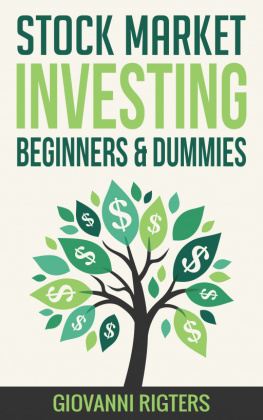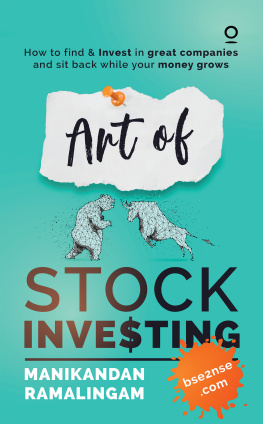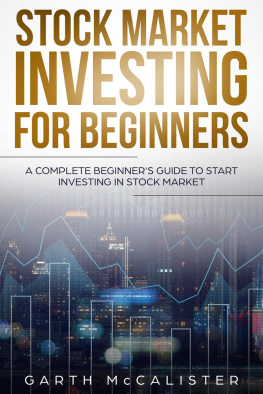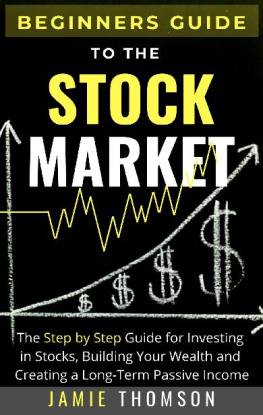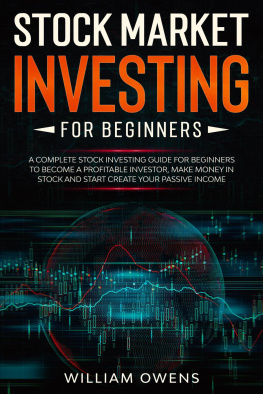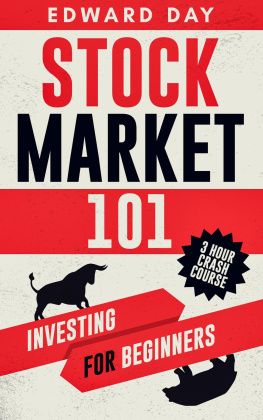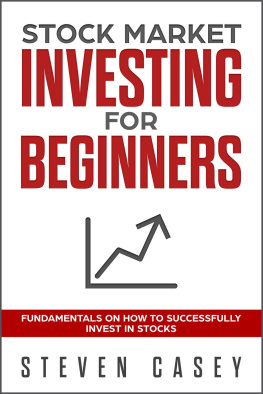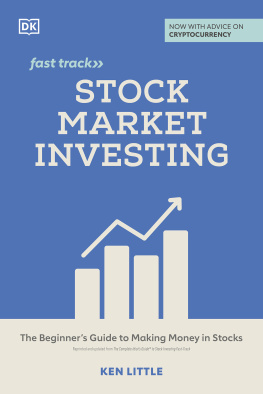Stock Market Investing
How to Make Money and Build Wealth
By Glenn Nora
Copyright 2020 - All rights reserved.
The contents of this book may not be reproduced, duplicated or transmitted without direct written permission from the author.
Under no circumstances will any legal responsibility or blame be held against the publisher for any reparation, damages, or monetary loss due to the information herein, either directly or indirectly.
Legal Notice:
You cannot amend, distribute, sell, use, quote or paraphrase any part or the content within this book without the consent of the author.
Disclaimer Notice:
Please note the information contained within this document is for educational and entertainment purposes only. No warranties of any kind are expressed or implied. Readers acknowledge that the author is not engaging in the rendering of legal, financial, medical or professional advice. Please consult a licensed professional before attempting any techniques outlined in this book.
By reading this document, the reader agrees that under no circumstances are is the author responsible for any losses, direct or indirect, which are incurred as a result of the use of information contained within this document, including, but not limited to, errors, omissions, or inaccuracies.
Table of Contents
A re you thinking about investing in the stock market? You are in for a great time if you do it right. Making a choice to invest money now, be it for a steady income, or a big payoff sometime down the line, is a wise decision. At the end of the day, you don't have any guarantees that there will be enough money to send your kids to college or for when you retire. There's no guarantee that your pension is going to be enough for you to live a comfortable life. By investing now, in the right stocks, you can have that nest egg to spend on whatever you want.
As a beginner, you might be hesitant to make the leap into the stock market. I don't blame you as it's a scary place, and it's no place for the nervous, either. A stock market is a daunting place, and if you don't know your way around it, it's easy to get lost.
That's why I wrote this guide; to give you a path to follow. My intention is to walk you through the basics, the ins and outs of how the stock market works, what the different investment types are, everything you need to know to decide if investing in the stock market is the right choice for you.
Join me on this fantastic journey, a journey that can lead you to the pot of gold at the end of the rainbow.
Chapter 1: All About Stocks and Investments
W hat is a Stock?
A stock is an investment that provides ownership shares in the company that owns the stock. In other words, you purchase a small part of the company.
General Terms Related to Stock Marketing Investing
The following common terms will help you understand the upcoming discussion.
What is a Stock Certificate?
A certificate that certifies you own shares in a specific company
Stockbrokers
Stockbrokers/shareholders refer to licensed firms or sales agents that allow their customers to sell and purchase stocks as well as other securities through the stock market exchange. They also provide stock market investing advice to their clients.
Stock Market Crash
When the prices of the stock drop down suddenly due to several economic factors, catastrophic events, or a state of turmoil in a country. That unfortunate event took place in the U.S. in 1929, famously known as Black Tuesday.
Stock Market Index
It refers to a digitized measurement tool that is used by financial advisors, managers, and investors to describe the market, and for the comparison of return gain for every specific stock.
Stock investment Portfolio
It refers to the acquisition of investments made by investors. There is no limit to the number of stocks and other securities investments, which means that you can own as many investments as you want.
What does Stock Market Investment Mean?
In the world of the stock market, investors commit their capital or money to one or several types of investments with an expectation to gain maximum profit or extra income.
You can think of it as gambling, as it is never 100% safe. But why? Because stock can go up and down depending on many variables, and you never know if your stock is going to gain or lose value within the next 5 minutes, let alone the future.
Types of Stocks and How They Work
T here are two main types of stocks: common stock and preferred stock. The company issues its stock share to the public, for sale in both types.
Stocks are further categorized into four categories based on company style, company size, location, and industry.
Below, we'll discuss each type in detail.
Common Stocks
These are ordinary stock shares which represent the partial ownership of investors in the company. If you are looking for long term return growth, you can opt-in for investing in common stocks. It provides you the voting rights on corporate related issues.
In simple words, common stock is a way to divide up the company's ownership as its one share will represent the ownership share percentage of a corporation. Let's suppose a corporation has 100 shares. One share will represent one percent ownership of that particular corporation.
The common stockholder can earn dividends (bonuses that stock owners receive regularly), but these dividends are not guaranteed as they may vary depending on the corporation's current fortune or profitability.
So, common stockholders are at high chance of risk, because when the company goes bust, you can lose all your investment.
Preferred Stock
Preferred stock does not give voting rights to stockholders. In this type of stock, dividends are higher, fixed, and paid to preferred stockholders by the corporation. So, these stockholders are less prone to investment risk.
After paying all preferred stockholders, the corporation then pays dividends to common stockholders. This type of stock investing is suitable for those investors who are looking for income rather than long term return growth.
When the company goes bankrupt, the assets are given to bondholders first and then to preferred stock owners. After that, common stockholders receive the assets, but in most cases, there is nothing left for them.
Other Stocks Categories
C ompany Style
It comprises growth stocks and value stocks. Growth stocks refer to companies that are looking to grow quickly and tend to have an increasing value in the market. Many investors prefer to invest more in these companies to get maximum return.
Next page


